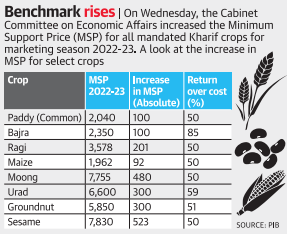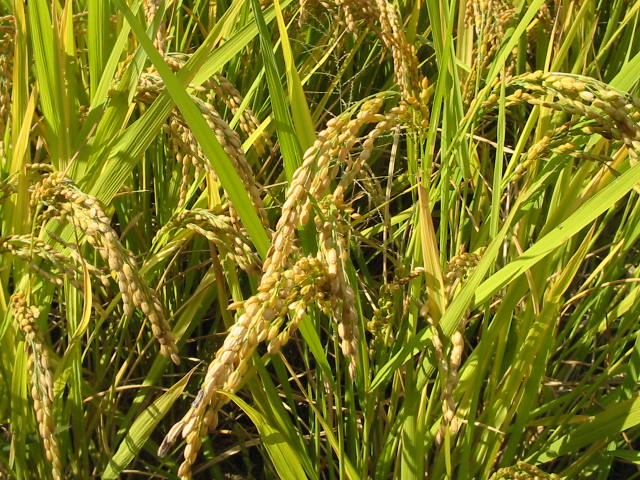News Highlights
The Union Cabinet raised the minimum support price (MSP) for paddy by ₹100 a quintal for the Kharif season of 2022 – 23. The rates for 14 crops have been increased in the range of 4% to 8%
Focus Points
- The new rates had been announced before the beginning of the sowing season, for assured returns to the farmers and to boost their morale
- The MSP for paddy (common), which was ₹1,940 a quintal in 2021 22, and paddy (grade A), which was ₹1,960 a quintal, had increased by ₹100.
- The highest increase had been for two varieties of jowar at the rate of 8%.
- The lowest increase of ₹92 had been for maize, whose price was ₹1,870.
- Reason for Increase
- The present increase comes against the backdrop of spiraling input rates, especially due to a sharp increase in fertilizer rates
- The increase has been announced at a time when the government is struggling to procure crops in the wake of a high demand because of global supply disruption. Farmers are selling crops in the open market since they are getting better rates.

Minimum Support Price (MSP)
- During each cropping season, the government announces minimum support prices for 23 crops.
- Simply put, the MSP for a crop is the price at which the government is supposed to procure/buy that crop from farmers if the market price falls below it.
- MSPs provide a floor for market prices, and ensure that farmers receive a certain “minimum” remuneration so that their costs of cultivation (and some profit) can be recovered.
- Crops Covered
- 7 types of cereals (paddy, wheat, maize, bajra, jowar, ragi and barley),
- 5 types of pulses (chana, arhar/tur, urad, moong and masur),
- 7 oilseeds (rapeseed-mustard, groundnut, soyabean, sunflower, sesamum, safflower, niger seed),
- 4 commercial crops (cotton, sugarcane, copra, raw jute)
- Who decided MSP?
- The MSPs are announced by the Union government and as such, it is the government’s decision.
- But the government largely bases its decision on the recommendations of the Commission for Agricultural Costs and Prices (CACP).
- While recommending MSPs, the CACP looks at the following factors:
- the demand and supply of a commodity;
- its cost of production;
- the market price trends (both domestic and international);
- inter-crop price parity;
- the terms of trade between agriculture and non-agriculture (that is, the ratio of prices of farm inputs and farm outputs);
- a minimum of 50 per cent as the margin over the cost of production; and
- the likely implications of an MSP on consumers of that product.
Kharif Crops
- They are consider are monsoon crops because sows during start of monsoon (June to July) and harvest at the end of monsoon (September to October)
- They require warm wet weather’
- Crops – Cotton , rice ,jowar , bajra
Pic Courtesy : The Hindu
Content Source : The Hindu



